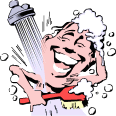Baths, showers and kilowatt-hours

The next time you pay your utility bill, try this simple calculation. Divide the total amount by seven. The result is the amount you spend to heat your water. Of course, you might consider this cost a small price to pay for the convenience of a hot shower, but over the course of a year, this cost adds up.
The following measures can help you decrease water-heating costs for showers and baths in your household by reducing the amount of hot water used.
Faucets and Showers
Simply repairing leaks in faucets and showers can save hot water. A leak of one drip per second can cost $1 per month, yet could be repaired in a few minutes for less than that. And some seemingly insignificant steps, practiced routinely, could have significant results. For example, turning the hot-water faucet off while shaving or brushing your teeth, instead of letting the water run, can reduce water-heating costs.
Other actions may require a small investment of time and money. Installing low-flow showerheads and faucet aerators can save significant amounts of hot water. A family of four, each showering for five minutes a day, uses 700 gallons of water a week – enough for a three-year supply of drinking water for one person. You can cut that amount in half simply by using low-flow aerating showerheads and faucets.
A quick test can help you determine if your shower is a good candidate for a showerhead replacement. Turn on the shower to the normal pressure you use and time how many seconds it takes to fill the bucket to one gallon. If it takes less than 20 seconds, you could benefit from a low-flow showerhead. A top-quality, low-flow, aerating showerhead will cost $10 to $20 and pay for itself in energy saved within four months. However, beware of buying a lower-quality showerhead that simply restricts water flow, resulting in poor performance.
You also can reduce hot water use by taking showers instead of baths. Although showers account for an average of approximately 37 percent of hot water consumption in a typical U. S. home, while baths are responsible for 12 percent, baths account for a smaller percentage of household hot water use on a national average only because more people take showers. Each bath uses 15 to 25 gallons of water, but a five-minute shower uses less than 10 gallons.
For additional energy-saving tips from the U. S. Department of Energy, log on to or Energy Efficiency and Renewable Clearinghouse at 800-363-3732 (toll-free) or P. O. Box 3048, Merrifield, VA 22116.
Page created and maintained by West Florida Electric Cooperative, Inc. © 2001.
designed by embryo design